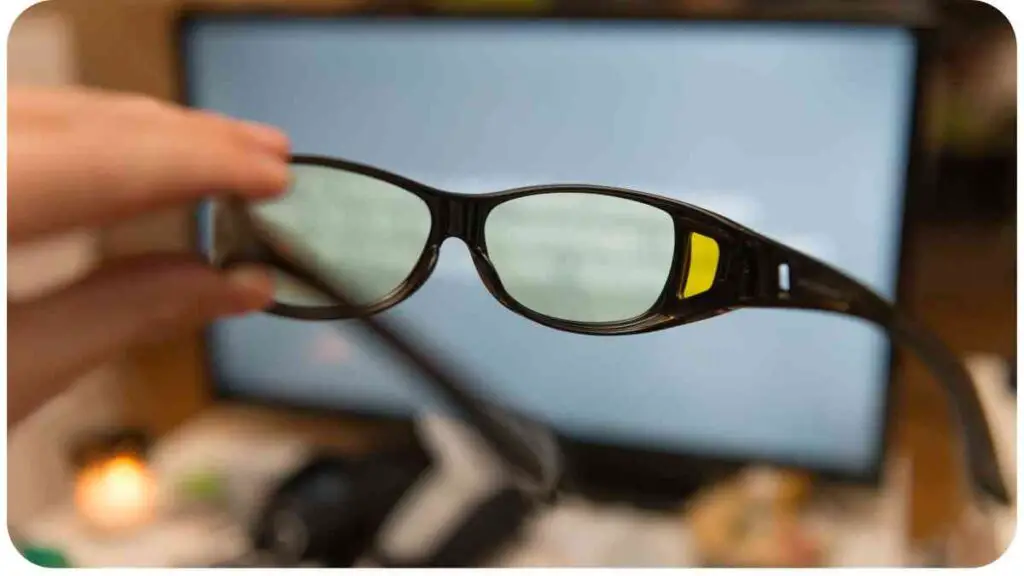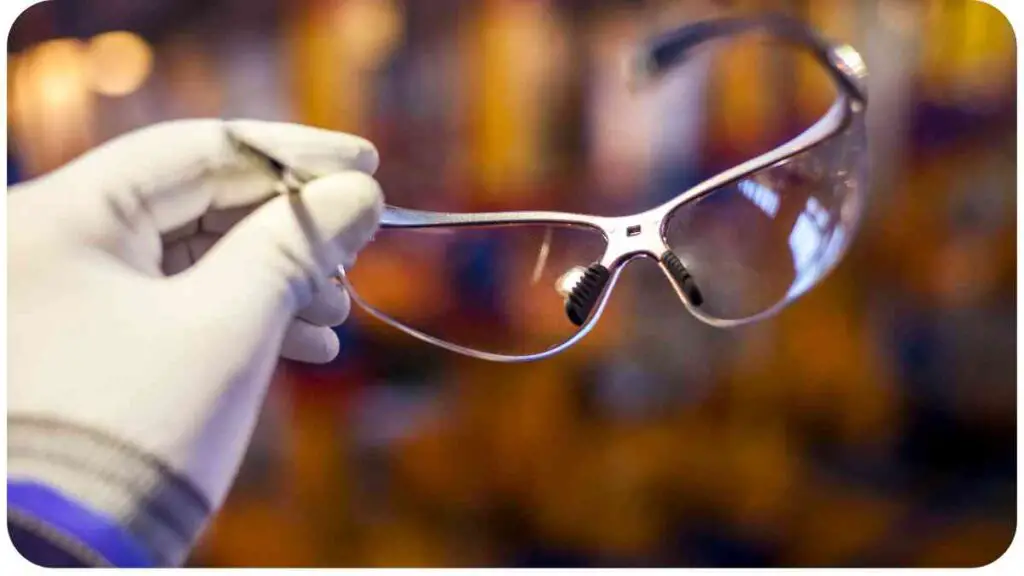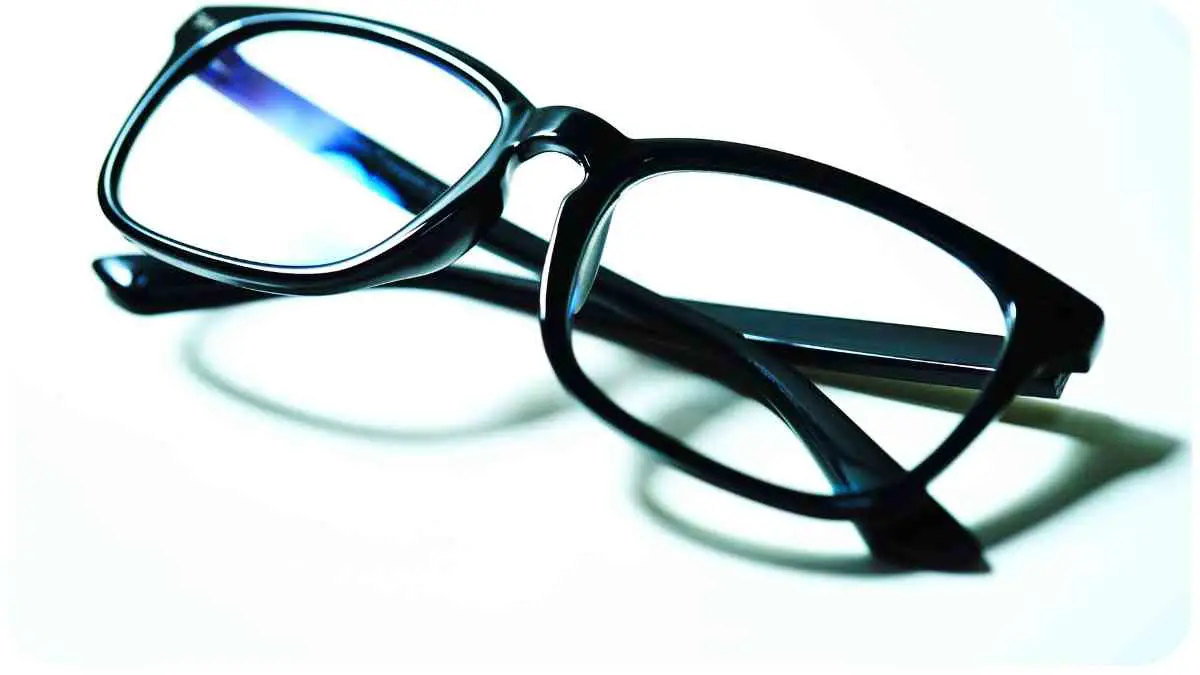Blue light glasses, also known as computer glasses, have gained popularity in recent years as a potential solution to the digital eye strain caused by prolonged exposure to screens. These specialized glasses claim to filter out a portion of the blue light emitted by electronic devices, aiming to reduce eye discomfort and improve overall eye health.
The 21st century has witnessed an unprecedented increase in screen time due to the widespread use of computers, smartphones, and other digital devices. With many individuals spending hours in front of screens for work, study, and leisure, concerns about the impact of blue light on eye health have escalated.
| Takeaways |
|---|
| – Blue light glasses may reduce eye strain during prolonged screen use. |
| – The effectiveness of blue light glasses varies among individuals. |
| – Gradual adjustment can help overcome initial discomfort when using blue light glasses. |
| – Consistent use of blue light glasses, along with breaks and outdoor exposure, can contribute to eye health. |
| – Balancing blue light protection with natural light exposure is essential for overall well-being. |
| – Regular eye check-ups are crucial, and blue light glasses should complement, not replace, professional examinations. |
| – Choosing the right pair involves considerations of style, comfort, and the quality of blue light filtration. |
| – Future advancements in eye protection technology may offer even more personalized solutions. |
| – The decision to use blue light glasses is a personal one, influenced by lifestyle factors and individual needs. |
How Do Blue Light Glasses Work?
2.1 Filtering Blue Light
Blue light glasses feature special coatings that selectively block or filter out a percentage of the high-energy blue light emitted by digital screens. This is intended to reduce the intensity of the blue light that reaches the eyes, potentially minimizing eye strain and discomfort.
Enhance your understanding of telecommuting’s psychological effects. Explore insights on mental health impacts and discover strategies to maintain well-being during remote work.
2.2 Impact on Melatonin Production
One key aspect of blue light is its role in influencing melatonin production. Melatonin is a hormone that regulates sleep-wake cycles, and exposure to blue light, especially during the evening, can suppress its production. Blue light glasses aim to mitigate this effect, potentially promoting better sleep quality.
Potential Benefits of Blue Light Glasses
3.1 Reduced Eye Strain
One of the primary claimed benefits of blue light glasses is the reduction of eye strain associated with prolonged screen time. The filtering of blue light is believed to contribute to a more comfortable viewing experience, particularly for those who spend long hours working on computers.
Debunking Myths About Blue Light Glasses

4.1 100% Blue Light Blocking Claims
One common misconception surrounding blue light glasses is the belief that they offer 100% protection against all blue light. It’s essential to clarify that most blue light glasses on the market do not block all blue light but instead filter a specific percentage.
Dive into practical advice on eyestrain prevention. Learn effective tips and tricks to alleviate eye discomfort, ensuring a comfortable and productive telecommuting experience.
While they can be effective in reducing exposure, they don’t eliminate it entirely. Users should be cautious of exaggerated claims and look for reputable brands that provide accurate information about their products.
4.2 One Size Fits All?
Another myth revolves around the idea that a single type of blue light glasses suits everyone. The effectiveness of blue light glasses can vary based on factors such as the individual’s screen time, the nature of their work, and their sensitivity to blue light. Choosing the right pair involves considering personal preferences, the specific wavelength of blue light being filtered, and the overall quality of the glasses.
Who Can Benefit the Most?
5.1 Office Workers
Office workers who spend extended hours in front of computers are among the primary beneficiaries of blue light glasses. These individuals often experience eye strain, fatigue, and headaches due to continuous screen exposure. Blue light glasses can potentially alleviate these issues, making the workday more comfortable.
Navigate the diverse landscape of virtual meeting software. Compare options and make informed decisions to ensure seamless and effective virtual collaboration with the right platform.
5.2 Students
Students, particularly those engaged in online learning or extensive research, may also find blue light glasses beneficial. Long study sessions can lead to eye strain and interfere with sleep patterns. Wearing blue light glasses may help maintain focus and reduce the impact of prolonged screen use on eye health.
5.3 Gamers
The gaming community, known for spending extended periods in front of screens, has shown interest in blue light glasses. While gaming doesn’t inherently harm the eyes, the cumulative effect of hours spent immersed in digital worlds can contribute to eye discomfort. Blue light glasses may offer a solution for gamers looking to protect their eyes during extended play sessions.
Choosing the Right Blue Light Glasses
6.1 Understanding Blue Light Coating
When selecting blue light glasses, understanding the type of coating used is crucial. Different coatings offer varying levels of blue light filtration. Some glasses focus on blocking a specific range of blue light wavelengths, while others aim for a broader spectrum.
Checking the product specifications and consulting with an eye care professional can help users choose glasses tailored to their needs.
6.2 Style and Comfort Considerations
Apart from functionality, the style and comfort of blue light glasses play a significant role in user satisfaction. People are more likely to consistently wear glasses that complement their personal style and feel comfortable during prolonged use.
Thankfully, the market offers a wide range of fashionable and ergonomic blue light glasses to suit diverse preferences.
Stay tuned as we delve deeper into scientific studies and expert opinions in the next section!
Gain valuable insights into the pros and cons of telecommuting. Delve into a comprehensive analysis that explores both the advantages and challenges of remote work, helping you make informed decisions.
Scientific Studies and Expert Opinions
7.1 Key Research Findings
Scientific studies have explored the impact of blue light on eye health and the effectiveness of blue light glasses in mitigating potential issues. While research is ongoing, some key findings suggest that blue light exposure can indeed lead to eye strain and disrupt sleep patterns. However, the degree of impact may vary among individuals.
A study conducted by the American Academy of Ophthalmology found that prolonged exposure to blue light emitted by screens can contribute to digital eye strain. The study suggests that reducing blue light exposure, either through screen adjustments or the use of blue light glasses, may alleviate symptoms.
7.2 Expert Recommendations
Optometrists and eye care professionals offer valuable insights into the benefits of blue light glasses. Dr. Sarah Johnson, a renowned optometrist, emphasizes the importance of balancing screen time and incorporating protective measures. While endorsing the use of blue light glasses for frequent screen users, she also highlights the significance of adopting healthy screen habits.
Dr. Johnson recommends taking breaks, following the 20-20-20 rule (looking at something 20 feet away for 20 seconds every 20 minutes), and adjusting screen brightness to reduce eye strain. Blue light glasses, when used in conjunction with these practices, can contribute to overall eye comfort.
DIY Strategies for Reducing Blue Light Exposure
8.1 Adjusting Screen Settings
Aside from using blue light glasses, individuals can implement DIY strategies to reduce blue light exposure. Most electronic devices have settings that allow users to adjust the color temperature of the screen.
Activating the “night mode” or “blue light filter” on devices during evening hours can help minimize the impact on melatonin production and improve sleep quality.
8.2 Taking Regular Breaks
One effective DIY strategy involves incorporating regular breaks into screen-intensive activities. The 20-20-20 rule, endorsed by eye care professionals, encourages users to take a 20-second break every 20 minutes and focus on something at least 20 feet away.
This simple practice helps relax eye muscles and reduce the strain associated with prolonged screen use.
In the next section, we’ll explore the delicate balance between blue light protection and the essential need for vitamin D.
Balancing Blue Light Protection and Vitamin D

9.1 Importance of Natural Light Exposure
While protecting the eyes from excessive blue light is essential, it’s equally crucial to ensure an adequate intake of natural light. Natural light exposure plays a vital role in the body’s production of vitamin D, a key nutrient for bone health and overall well-being. Striking a balance between blue light protection and maintaining healthy vitamin D levels is crucial.
9.2 Finding the Right Balance
To find the right balance, consider spending time outdoors during daylight hours. Exposure to natural sunlight not only supports vitamin D synthesis but also helps regulate circadian rhythms, contributing to better sleep. When using blue light glasses, be mindful of incorporating breaks outdoors to enjoy the benefits of natural light.
Real-World Experiences: Success Stories
10.1 User Testimonials
Many individuals have shared positive experiences with blue light glasses. Rachel, a graphic designer, noticed a significant reduction in eye strain after incorporating blue light glasses into her work routine. She found that the glasses made long hours of design work more comfortable, and she experienced fewer headaches.
John, a college student, used blue light glasses during late-night study sessions. He reported improved sleep quality and reduced eye fatigue. These testimonials highlight the potential benefits of blue light glasses in real-world scenarios.
10.2 Expert Opinions
Leading optometrists and experts in the field offer insights into the effectiveness of blue light glasses. Dr. Emily Wong, a respected eye care professional, suggests that while blue light glasses can be beneficial, they are not a one-size-fits-all solution. Personal factors such as individual sensitivity to light, overall eye health, and lifestyle play crucial roles in determining the efficacy of blue light glasses.
In the following section, we’ll address common challenges associated with blue light glasses and strategies to overcome them.
Common Challenges and How to Overcome Them
11.1 Initial Discomfort
Some users may experience initial discomfort when transitioning to blue light glasses. This discomfort can include mild headaches or changes in visual perception. Experts suggest a gradual adjustment period, starting with short periods of use and gradually increasing the duration. It’s also essential to ensure the glasses have the correct prescription if needed, as improper prescriptions can contribute to discomfort.
11.2 Inconsistency in Usage
Consistency is key for experiencing the full benefits of blue light glasses. Inconsistent usage may result in users not realizing the potential improvements in eye comfort and sleep quality. Creating a routine, such as wearing glasses during work or study sessions, can help establish a habit. Keeping the glasses easily accessible, such as placing them near the computer, serves as a reminder to use them consistently.
Maintaining Eye Health Beyond Blue Light Glasses
12.1 Regular Eye Check-ups
While blue light glasses can contribute to eye comfort, they are not a substitute for regular eye check-ups. Periodic visits to an optometrist are crucial for assessing overall eye health, identifying any vision changes, and ensuring the correct prescription. Blue light glasses can complement a comprehensive eye care routine but should not replace professional eye examinations.
12.2 The 20-20-20 Rule
As mentioned earlier, the 20-20-20 rule is a valuable practice for maintaining eye health. Integrating this rule into daily screen time helps prevent eye strain by providing regular breaks for the eyes. It’s a simple yet effective strategy that anyone can incorporate into their routine, whether or not they use blue light glasses.
The Future of Eye Protection Technology

13.1 Innovations in Blue Light Blocking
The field of eye protection technology is continually evolving, with ongoing innovations in blue light blocking. Researchers are exploring advanced coatings and materials that offer enhanced protection without compromising clarity. Future developments may lead to even more effective and personalized solutions for individuals seeking to safeguard their eyes from the effects of prolonged screen exposure.
13.2 Integrating Eye Protection in Devices
As technology advances, there’s a growing emphasis on integrating eye protection features directly into electronic devices. Some smartphones and computers now come equipped with built-in blue light filters that users can activate. This integration reflects a broader awareness of the impact of digital screens on eye health and a commitment to providing users with tools to mitigate potential issues.
In the concluding section, we’ll summarize the key points and provide additional resources for readers interested in further exploration.
Conclusion
14.1 Personal Choice and Lifestyle Factors
In the realm of blue light glasses, the decision to use them ultimately boils down to personal choice and lifestyle factors. While scientific studies and user testimonials suggest potential benefits, it’s essential to consider individual needs, preferences, and overall eye health. Blue light glasses can be a valuable tool for mitigating eye strain and improving sleep quality, but they are not a universal solution.
The verdict on whether blue light glasses are worth it depends on individual circumstances. For those who spend extended hours in front of screens, such as office workers, students, or gamers, blue light glasses may offer tangible benefits in reducing eye strain and enhancing overall comfort.
However, it’s crucial to use them in conjunction with other eye care practices, such as regular breaks and outdoor exposure to natural light.
Further Reading
- TEC Eye Care – 5 Reasons Why You Should Be Wearing Blue Light Glasses: Explore the comprehensive reasons advocating the use of blue light glasses. Uncover insights into the potential benefits that align with maintaining eye health in the digital era.
- River Heights Eye Care – What Are the Benefits of Blue Light Glasses?: Delve into the specific advantages of incorporating blue light glasses into your daily routine. Gain a deeper understanding of how these glasses can contribute to eye comfort and overall well-being.
- Healthline – What Are Blue Light Glasses?: Healthline offers an informative overview of blue light glasses, exploring their functions, potential benefits, and how they impact eye health. This resource provides a balanced perspective on the topic.
FAQs
Do Blue Light Glasses Completely Block All Blue Light?
No, most blue light glasses do not offer 100% protection. They filter a specific percentage of blue light, reducing but not eliminating exposure.
Can Anyone Benefit from Using Blue Light Glasses?
While beneficial for many, the effectiveness varies. Individuals who spend extended hours in front of screens, like office workers and students, are more likely to experience positive results.
Do Blue Light Glasses Replace the Need for Regular Eye Check-ups?
No, blue light glasses complement but do not replace regular eye check-ups. Professional examinations are essential for overall eye health.
How Can I Minimize Initial Discomfort when Using Blue Light Glasses?
Start with short periods of use and gradually increase duration to allow your eyes to adjust. Ensure the glasses have the correct prescription if needed.
Is Natural Light Exposure Still Important When Using Blue Light Glasses?
Yes, natural light exposure remains crucial for vitamin D synthesis and circadian rhythm regulation. Striking a balance between protection and natural light is key.

Hi there! I’m Hellen James, and I’ve been working at home for over a decade. I’ve been looking for ways to be more efficient at home, and I have a bunch of tips that you’ll love.


